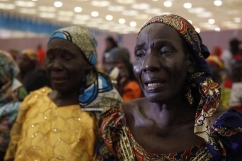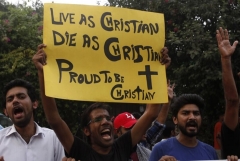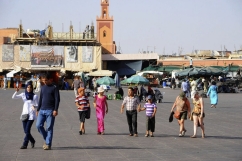Victims of rape and kidnapping at the hands of Boko Haram are often rejected and ostracised after they are released, reveals a new study by UNICEF and International Alert.
As military forces reclaimed land captured by the jihadist group, hundreds of women and girls have been released from captivity, said the study. However in refugee camps or in their home communities, they face persecution.
"As they return, many face marginalization, discrimination and rejection by family and community members due to social and cultural norms related to sexual violence," the report says.
"There is also growing fear that some of these girls and women were radicalized in captivity. The children who have been born of sexual violence are at an even greater risk of rejection, abandonment and violence."
All victims of sexual violence in Nigeria are stigmatised but those returning from Boko Haram captivity face particular persecution because communities fear they and the children fathered by jihadis have been radicalised.
The report, released this week, is called 'Bad Blood: Perceptions of children born of conflict-related sexual violence and women and girls associated with Boko Haram in northeast Nigeria.' The study conducted a number of interviews and discussion groups in Borno, north-eat Nigeria.
"Many perceive these victims of conflict as being partly responsible for the violence and losses suffered by entire communities during the insurgency," report authors wrote. "As a result, children and newborns as well as their mothers are being increasingly ostracized and are at risk of further violence."
Nigerian President Muhammadu Buhari declared the "technical defeat" of Boko Haram at the end of 2015. However the militants, who no longer control vast swathes of land in Nigeria, still carry out sporadic attacks of villages and markets. Most recently 58 were killed in a twin-bombing at a refugee camp, 55 miles outside Maiduguri.
The jihadist group, who have claimed allegiance to ISIS, have exceeded their atrocities and were labelled the deadliest terror group in the world according to the 2015 Global Terrorism Index.
















